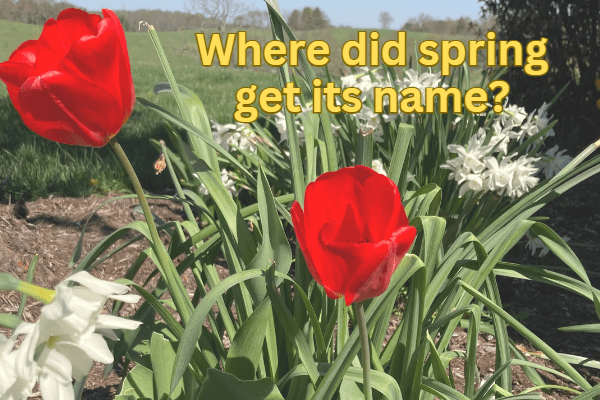The sudden change of temps in March and early April frustrate me. What is one supposed to wear on a sunny spring day when it’s 35 degrees outside?! My daughter said she was complaining to a friend about the bright warm days followed, without warning, by gray rainy days, and he said, “Hmmm. Sounds like spring.” (***insert sarcastic tone***) Which prompted me to wonder, does spring get its name from the springing up and down of temperatures?
Not exactly.
According to the Online Etymology Dictionary, before the 14th century, people called the early season of the year Lent. This came from the Old English lencten, meaning lengthen. It referred to the increasing length of daylight as the season progressed. Lent is still used by some religions to mark the time between Ash Wednesday and Easter Sunday, but by the 1500s, “spring” took over as the name for the season.

Spring comes from the Old English springan, meaning “to leap, burst forth, fly up; spread, grow.” It also has roots (pun intended) in the Dutch springhen, and the German springen. Seems fitting that we should use a springy word to describe the time of year when plants spring up out of the ground and leaves bud on trees. Early forms of the term in the late 14th century included “springing time.”
I thought it was also interesting to see spring related to the Sanskrit word sprhayati meaning “desires eagerly” and the Greek word sperkhesthai “to hurry.” All of those seem to fit, right?
Fun Word Nerd note: the first known use of “spring fever” was seen in 1843 to describe a “surge of romantic feelings.” Previous to that, spring fever had referred to a kind of disease or cold often seen during spring. Love and disease. Now, there is something to ponder.
So, spring isn’t meant to describe the daily high temperatures that bounce up and down like a wire coil. (Although it could.) Instead, it describes a season of sprouting growth bursting forth. I’ll take it, along with a cardigan sweater for layering in case it’s one of those cool days. 😉
Have an interesting word etymology you’d like to share? Has spring sprung where you live?
Thanks for getting nerdy with me!


